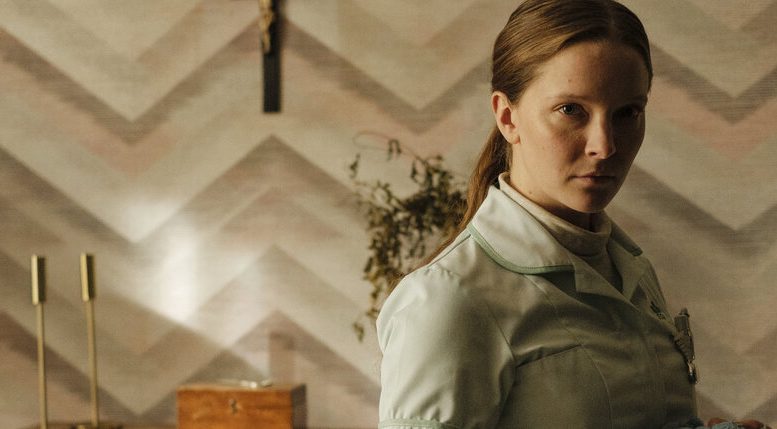The Associated Press
Religion and horror are hardly novel bedfellows, but writer-director Rose Glass crafts something fresh of the construct in her promising debut “ Saint Maud.” The film follows the psychological undoing of a devout hospice nurse who becomes obsessed with saving the soul of her terminally ill patient.
An uneasy and slightly sinister mood is established right from the start and barely lets up for the duration. Lean and measured, Glass’ film drops the audience in the middle of a bloody mess, although it’s ambiguous at first as to whether or not we’re seeing the beginning or the end. There’s a body on an operating table and a young woman in the corner with her face covered in blood. The next image we see is a close-up of boiling tomato soup in a grim and claustrophobic studio apartment in the seaside hamlet Coney Island (in Northern Ireland, not New York). The woman there, Maud (Morfydd Clark), is packing up to leave.
The first words we hear from her are in voiceover. She’s not talking to us, but to God, wondering when she’ll find clarity of purpose. “I can’t shake the feeling that you must have saved me for something greater than this,” she says. Her musings often sound like diary entries.
The new client is Amanda Kohl (Jennifer Ehle), a 49-year-old dancer, choreographer and “minor celebrity” who has written books with vaguely erotic titles like Anatomy of Dance and The Body is a Stage. She has stage 4 lymphoma of the spinal cord and, Maud says, is not long for the world.
They are a mismatched pair in almost every way. Maud has a Victorian sternness to her, while Amanda is pure hedonism. Maud even says early on that she has little time for creative types, “as they tend to be rather self-involved.” But the film teases us a bit with the possibility of connection between the two who at least seem open to each other at first. Maud projects what she wants to on Amanda, and Amanda does the same for her, but we don’t get the benefit of Amanda’s internal dialogue. At least Amanda is curious, which is more than most people seem to be about the mousy Maud. And besides, she has Big Questions about the nearing end of her life and Maud believes she is uniquely positioned to provide answers. The odd and immediate intimacy of hospice care permeates the more off the wall aspects of “Saint Maud.”
But be careful who you call your savoir because they might take it literally. Amanda quickly becomes an enveloping obsession for Maud, who with this new clarity of purpose has ecstatic fits and visions. She also gets incredibly and oppressively sanctimonious. It’s even kind of awkwardly funny at times. But she oversteps and, eventually, is dismissed in humiliating fashion. And things just devolve into a nightmare from there. Some of her modes of penance will surely invade your dreams.
“Saint Maud” is not terribly interested in why Maud became this way or who exactly she was before (although we do get some tidbits). That becomes a bit alienating and tests your investment in watching this character self-destruct, but Glass moves things along quickly and viscerally and always has something interesting or distinctive on the screen. It is also more restrained than, say, an Ari Aster horror. With “Saint Maud,” Glass firmly establishes herself as a filmmaker to watch.
“Saint Maud,” an A24 release in theaters now, is rated R by the Motion Picture Association of America for “disturbing and violent content, sexual content and language.” Running time: 84 minutes. Two and a half stars out of four.









































